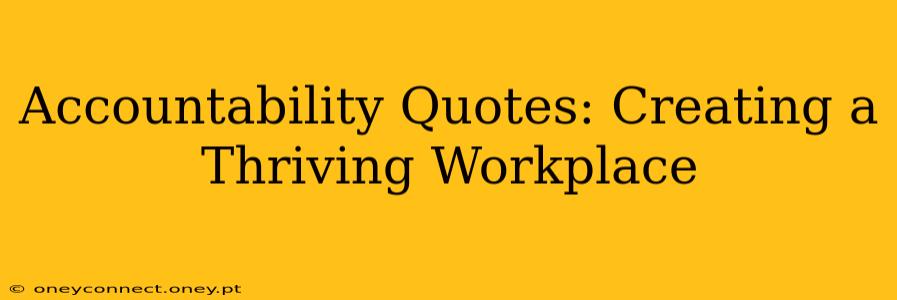Accountability. It's a word that resonates in every successful workplace, yet its true meaning and impact often get lost in the shuffle. More than just taking responsibility for your actions, accountability fosters a culture of trust, collaboration, and high performance. This isn't about blame; it's about ownership, improvement, and shared success. Let's explore how embracing accountability can transform your workplace and unlock its full potential. We'll delve into insightful accountability quotes that highlight its importance, and address some frequently asked questions surrounding this crucial element of a thriving work environment.
What Does Accountability Really Mean in the Workplace?
Accountability in the workplace isn't simply about pointing fingers; it's a proactive approach to ensuring everyone contributes their best and takes ownership of their roles. It's about establishing clear expectations, providing the necessary resources and support, and then empowering individuals to deliver results. It's a two-way street: management needs to provide clear direction and support, while employees need to take responsibility for their actions and actively seek solutions when challenges arise. This mutual commitment forms the bedrock of a high-performing team. Think of it as a shared responsibility for success, not individual blame for failure.
The Power of Accountability Quotes: Inspiring Action and Change
Many insightful quotes capture the essence of accountability and its transformative power. These aren't just inspirational phrases; they are guiding principles for building a strong and successful workplace. Here are a few examples:
-
"Accountability breeds response-ability." This quote highlights the direct link between taking ownership and being proactive in finding solutions. When individuals feel accountable, they're more likely to take initiative and find ways to overcome challenges.
-
"The price of inaction is far greater than the cost of making a mistake." This emphasizes the importance of taking action, even if it means making mistakes. Learning from those mistakes is a crucial part of growth and development within an accountable environment.
-
"Holding yourself accountable is the first step toward success." This quote stresses the importance of self-accountability, the foundation upon which team accountability is built. If individuals don't hold themselves accountable, it's difficult to build a culture of shared responsibility.
How to Foster Accountability in Your Workplace
Creating a culture of accountability requires a multifaceted approach:
-
Clear Expectations: Establish clear goals, roles, and responsibilities for every team member. Ensure everyone understands their contribution and how it aligns with the overall objectives.
-
Open Communication: Foster a culture of open and honest communication. Encourage feedback, both positive and constructive, and create a safe space for individuals to express concerns and ideas.
-
Regular Check-ins: Regular check-ins provide opportunities to monitor progress, address challenges proactively, and provide support. These shouldn't be performance reviews, but collaborative sessions to ensure everyone is on track.
-
Consequences & Recognition: Establish clear consequences for a lack of accountability while also recognizing and rewarding those who consistently demonstrate it. This balance is crucial for maintaining fairness and motivation.
-
Lead by Example: Leaders must model accountable behavior. This means taking ownership of their actions, admitting mistakes, and actively working to improve.
H2: How Do You Implement Accountability Systems?
Implementing accountability systems effectively requires a structured approach. Start by defining clear roles and responsibilities, outlining expected outcomes, and establishing metrics to track progress. Regular performance reviews should assess not only results but also the process and the commitment to accountability. Tools like project management software can aid in tracking progress and ensuring transparency. Crucially, these systems should be designed to support and empower employees, not to control or punish them. Focus on collaborative problem-solving and continuous improvement.
H2: What Are the Benefits of a Culture of Accountability?
A thriving culture of accountability leads to numerous benefits:
-
Increased Productivity & Efficiency: When everyone is responsible, projects are completed more efficiently and effectively.
-
Improved Morale & Engagement: Employees feel valued and empowered when they are trusted and held accountable for their contributions.
-
Stronger Teamwork & Collaboration: Accountability fosters a sense of shared responsibility and encourages collaboration.
-
Higher Quality Work: When everyone is accountable, the quality of work improves significantly.
-
Greater Innovation & Creativity: A culture of accountability fosters an environment where people feel comfortable taking risks and trying new things.
Conclusion
Accountability isn't a punishment; it's an investment in a thriving workplace. By embracing accountability, you foster a culture of trust, collaboration, and high performance. Remember the power of leading by example, setting clear expectations, and providing consistent support. By implementing effective accountability systems and recognizing the invaluable contributions of every team member, you unlock your team's full potential and create a workplace where everyone feels valued and empowered. Remember, the journey toward a more accountable workplace is ongoing, requiring continuous refinement and adjustment. The rewards, however, are well worth the effort.

